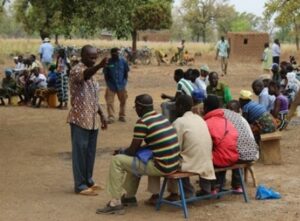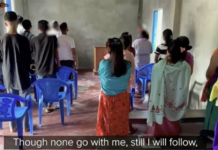
HOUSTON, TX (ANS) – In the Fall of 2017 Hurricane Harvey hit a large region of Southeast Texas. Millions of lives were impacted by the storm. Many of us were not flooded and had the opportunity to assist and serve others. There was an outpouring of compassion, from throughout Greater Houston, as well as from those who came from around the country. Many turned to the Lord during that crisis time. Stories are still being told of how the Lord intervened and how God worked in the lives of those in need, as well as those who were able to help others. It seems that God often does His greatest work in times of trouble. That truth is evident throughout history and throughout the world.
Streams in the Dessert
One of my mentors used to say that “every negative has a positive, and the more negative the negative, the more positive the positive.” It’s not always easy to remember that, but it is true. Numerous passages of Scripture would support that truth. God is certainly working all things after the council of His own will. He is working all things together for our good and His glory. The more we internalize and meditate on His Word, the better we can endure the times of trouble. Not only endure, but also experience a life of victory and fruitfulness for His Kingdom purposes. We can experience streams in the desert. These truths are something we all need to be reminded of often. Crisis times can be times of opportunity, when we keep our eyes on Jesus.

Going to Jesus First
In a region near the Congo River in the Central African Republic, a lady, for the first time in her life, heard the story from the Bible about Jesus Calming the Storm. After she heard the story, and a time of discussion and reflection, she said, “I see that during this storm, this difficult time, those disciples went to Jesus for help.” She went on to say, “I see that in my difficult times, I should be going to Jesus, instead of the witch doctor. So, from now on, I’ll be going to Jesus, instead of the witch doctor.” This is a great example of how the Holy Spirit can give insight, understanding and applications when people hear stories from the Word of God.
Mother of all Learning
The lady who told the story had just learned it at a Living Water Orality Training Workshop, and immediately shared it with others in her village. In our training, we emphasize that we don’t have to be great story tellers, because we have great stories to tell. Also, trainees discover the power of learning a little, practicing a lot, implementing immediately and telling the stories often. Repetition being the “Mother of all learning” is another important principle that we emphasize. Participants are trained to tell the stories from the Bible, facilitate small group retelling and discussion, and how to help others discover the meaning and applications from the lessons in the stories. Making sure that our message and methods are Biblical, understandable and reproducible are other key components.
Uniqueness of Jesus
We all face storms in life. A great question to ask and conversation starter is, “Would you like to hear a story that will help you better deal with the problems and difficulties in life?” This particular story is short and easy to learn, but can be used to communicate many important lessons. We can use this story to talk about the uniqueness of Jesus, about His humanity — He was tired and sleepy, so He was sleeping in the back of the boat during the storm. Yet, He demonstrated His deity by showing His power over nature.

Power of Simplicity
There are hundreds of stories from Scripture that can be used to share the Good News of Jesus and introduce others to a relationship with Him. Telling short, simple stories can lead to sharing God’s grand story of redemption. It’s been our experience that with a set of five stories from the gospels, we can give a village, community or tribal groups a simple narrative theology of what it means to have a relationship with the Living God, and become reproducing followers of Jesus. A key factor is the pre- and post-story discussion and dialogue to understand the message, lessons and applications from the stories.
A Story that Transforms
One of the many benefits of Orality Training is that people learn how to effectively share the Word of God and become reproducing followers of Jesus. In Living Water International’s introductory training, we emphasize how we can use any of the stories as vehicles for communicating many biblical themes and spiritual truths. In a situation where people know little about God or the Bible, here are a couple of questions that can be asked, “Would you like to hear a story that will help you discover the path to God?” Or, “Would you like to hear a story that can help you have a more personal and intimate relationship with God?”
Telling the Story of Jesus Calming the Storm can lead to a series of questions. The following are a few examples we use in processing the lessons from the story:
* What can we learn from this story about how Jesus cares?
* Does Jesus still have power over nature and our circumstances?
* Can Jesus still bring calmness to us during our storms of life?
* Does God’s Word still have power to change things and change lives?
* What do we learn from Jesus’ question, “Why are you so afraid? Where is your faith?”
* Is there a lesson in the question the disciples asked each other, “Who is this man, that even the wind and waves obey Him?”
* From this story, what do we learn about the humanity and deity of Jesus? His uniqueness?
God’s Wisdom and Direction
Let’s go back to the idea of going to Jesus first, instead of the witch doctor. In our cultural context, how often do we go to the wrong source first or try to come up with some human solution? What about when we face problems and difficulties, who do we go to? It could be that if we go to Jesus first, we may not need to go to other sources. He may often use some other human resource in our lives, but He may desire to answer our prayers or meet our needs in different ways than what we think. It can’t hurt to go to Him first, then trust Him to give wisdom and direction.
Important Lessons from Jesus
An important lesson we learn from Jesus is that He did nothing of Himself, but what He saw the Father doing is what He did. The fact is, that is how He desires for us, as His followers, to live our lives. When we make ourselves available to the Lord Jesus, as He made Himself available to the Father through the Eternal Spirit, He will make Himself available to us. We can see the same God in action today, who was active through the humanity of Jesus 2,000 years ago. We are the temple, the dwelling place of God, and can be instruments of His love, power, and redemptive activity today.

Fruit that Remains
God is using these simple methods and strategies for rapidly spreading the gospel. Disciple making and church multiplication movements worldwide are happening primarily through the use of oral learner friendly methods. Some key features are repetition, learning in community and focusing on the life, teachings and Spirit of Jesus. Ultimately, it’s the reproducing life of the Lord Jesus, in and through available human vessels, that produces lasting fruit that remains.
Our Model as a Communicator
In the modern Western World, we sometimes make things more complicated than they need to be. Then when we try to take those methods to the rest of the world, it just doesn’t fit. Even in the various cultures in North America, we sometimes tend to complicate the message of God and fail to appropriately communicate it to those who need it most. Jesus, of course, is our best model as a communicator, a trainer and disciple-maker. He told stories and parables, asked questions, created community and relationships that have been reproduced ever since. However, after the invention of the printing press, the church became more dependent on text-based methods and neglected the most effective ways that people have learned and communicated from the beginning of time.
Back to Basics
Some pastors, mission leaders and scholars are now recognizing the value and great need of getting back to the roots of the Early Church. Small, simple, reproducible systems and structures are more effective in today’s world than big, expensive institutions and programs. The methods and strategies that God used then will still work today. God is an equal opportunity employer, and He will continue His work through each of us if we make ourselves available, act on His Word, and trust and obey Him. The troubling times that are happening around the world can be redemptive opportunities when we keep looking to Jesus, the author and finisher of our faith.
For more information, visit – www.water.cc/orality-training or www.orality.net






